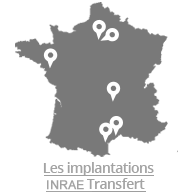In this domain, INRA Transfert proposes the following services:
- Identify a private partner to validate or leverage technical results in sustainable agriculture;
- Receive support at the various stages of setting up transverse projects with various stakeholders in agricultural development (ANR, Casdar, FUI etc.);
- Obtain information about events and publications organised by INRA's 'SIG Sector' (Scientific Interest Group Sector), see the latest results of SIG projects, and/or be introduced to the scientific coordinators of these consortia.
To access these INRA Transfert services, please direct your enquiry to:
- For arable crops with high economic and environmental performance (GC HP2E SIG): stephanie.potok@inra.fr
- For animal production systems with high economic, environmental and ethical performance (Elevages Demain (Animal Rearing of the Future) SIG): stephanie.potok@inra.fr
|
What is an SIG Sector? In a context characterised by rapid technological changes, economic uncertainty and consumer expectations, there are an ever increasing number and diversity of requirements that must be meet to ensure the sustainability of agricultural production systems. For professionals in these sectors, the challenge is to tackle these various requirements by working toward a convergence of improvements in economic, environmental and social performance. This vision prompted INRA to create its SIG Sectors (Scientific Interest Group Sectors), whose purpose is to contribute to an innovation-oriented 'sustainable development' model by generating scientific and operational knowledge. These research and development consortia can involve research institutes, institutions of higher education, technical institutes, upstream and downstream professional partners and stakeholders from the public arena. The SIGs allow the various partners to participate in the early stages of R&D programmes to identify new topics of interest while incorporating all relevant technical, social and economic approaches. The objective is to achieve scientifically proven innovations that are operational in the field and integrated into more sustainable production systems. |
Learn more about Successes in Sustainable Agriculture



